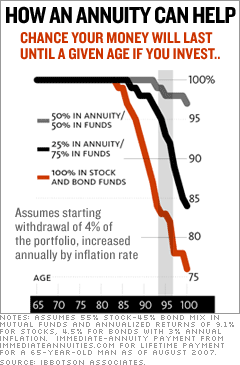It's true that baby boomers will get far less financial help from pensions than their parents did. Seeking to cut the cost of providing retirement benefits, more and more companies are dropping or freezing their traditional plans - the ones that your boss paid for, the ones that gave you a guaranteed monthly income for the rest of your life - leaving you with retirement accounts like 401(k)s that you have to fund and manage.
In 2005 only one in 10 private-sector employees was covered solely by a defined-benefit plan, compared with 37% in 1985, while the percentage of employees with 401(k) plans jumped to 63% from 28%. Without a pension you lose the prospect of a predictable lifetime paycheck. That's the story, anyway.
But the truth is, the defined-benefit pension was never a fabulous deal for most workers. Because the traditional pension is designed to reward longtime employees, the size of the pension depended in large part on how long you stayed with your employer. So if you switched jobs a few times during your career, as most people do, you lost most of the benefit.
According to the Employee Benefits Research Institute (EBRI), last year the average annual pension payout for those age 65 and older came to just $10,902. When held up against good old pensions, the 401(k) tends to get a bum rap. Because it's portable, a 401(k) allows you to have a normal, 21st-century flexible career and still put away enough to fund a more comfortable retirement. And if it's that "check a month for life" feeling you want, it's a simple matter to convert your 401(k) savings into a pension-like income stream.

